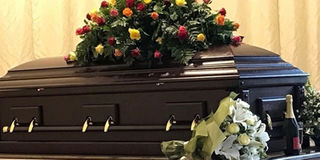Cost of funerals is a burden for the bereaved in DR Congo

What you need to know:
- As hundreds of wakes are held every day in the city of some 10 million people, there are rich rewards for venues that are transformed into temporary funeral parlours
- For the poorest families, a nightmarish vicious circle begins -- they need to pay to keep the body in the morgue while trying to raise enough money for the funeral
In Kinshasa, perhaps just one thing beats the cost of living -- and that's the cost of being dead.
Since the start of the year, funerals have become a common sight in the Democratic Republic of Congo's capital, the tragic outcome of floods, cholera and political violence.
But for many bereaved, the loss of a loved-one also comes with the dread of the astronomical bill -- as much as a year's wages -- for saying farewell to them.
The morgue, the wake, the burial, catering for mourners and receiving far-flung relatives... put this lot together, and the bill typically tots up to around $2,500 dollars (2,000 euros).
By way of comparison, a supermarket employee in Kinshasa earns between $100 and $150 a month, while the average civil service wage is about $200 a month.
The grieving family of Jose Fataki, the humble driver of a motorcycle taxi, has been faced with a heavy burden after he was killed on the sidelines of a protest march on December 31.
The dead man's nephew, lawyer Eric Fataki, said relatives raised the equivalent of $620 to pay for the body to be prepared and laid out for mourners in a canvas marquee next to a public hall.
In an adjoining area, Martine Mujinga watched over the body of her deceased sister Julie, whose life was claimed by illness. "The hall cost us $520," Mujinga said.
"The state takes a share of $20 for every wake" in a public hall, the manager of a venue in the poor Matete district of Kinshasa told AFP.
As hundreds of wakes are held every day in the city of some 10 million people, there are rich rewards for venues that are transformed into temporary funeral parlours.
"In Kinshasa, there are more than 800 registered halls," according to the provincial minister of finance, Guy Matondo. Such premises also frequently serve for more cheerful activities, such as weddings, concerts and conferences.
Vicious circle of costs
The bill to pay due respect to the dead starts at the morgue.
Benoit Kulube, a retired government worker, said he had to pay more than $100 to preserve the body of his 17-year-old son, a victim of the cholera outbreak in Kinshasa, made worse by flooding in unsanitary districts.
For the poorest families, a nightmarish vicious circle begins -- they need to pay to keep the body in the morgue while trying to raise enough money for the funeral.
As the clock ticks, many turn in desperation to relatives who live and work in the European diaspora, if there are any.
To have his son embalmed, currently a trendy practice in Kinshasa, Kulube paid a further $50. Then there was his expenditure for new clothes for the body.
Next comes the choice of coffin. The cheapest models sell for about $250, while a luxury casket can cost more than $1,000.
Jose Fataki's family bought a coffin worth $700. "This was thanks to assistance from Kinshasa civic authorities, the church and contributions from family members," Eric explained.
But the bill continues to rise. Transporting the body from the morgue to the funeral parlour and then on to the cemetery can cost anything between $100 and $500.
Retired civil servant Kulube chose to rent an ordinary vehicle for $22, rather than pay for a hearse, which was "beyond the reach" of his budget.
At funerals that draw a large number of mourners, families also rent buses to transport members of the clan and friends from the funeral parlour to the cemetery.
During the wake and the days leading up to the burial, sometimes later, the family of the deceased is expected to feed all the guests. "This is the custom," Kulube said. "They (the guests) also chip in financially."
Funerals before medical care?
But there are unwelcome intruders who read the funeral announcements of the day and then show up to tuck into the food and drink. "Most of those who come never knew the deceased closely or distantly," writer Tsitenghe Lubabu raged on the website of news magazine Jeune Afrique.
"For them, there is no shame in pinching from the plates, whatever the circumstances," he wrote.
Burial doesn't come cheap either. A plot in the cemetery costs $150, with $100 more for the gravediggers and a compulsory tax of 15,000 francs ($10) payable to the Republican Guard, said Kulube, who was planning to bury his son.
In many western countries, many funeral parlours offer no-frills options, including an environmentally-friendly wicker casket.
But this thinking has a very long way to go in DR Congo, "where people save money to pay for lavish funerals rather than subscribe to medical care," said social historian Zacharie Bababaswe.
A first step would be to launch a debate about cremation, "although though this is liable to shock many Congolese people," he said.




